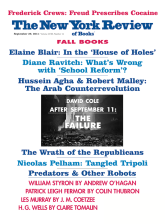In response to:
The Mystery of Consciousness Continues from the June 9, 2011 issue
To the Editors:
Antonio Damasio and John Searle have both contributed a lot to our understanding of the nature of consciousness, but I would suggest that neither they nor anyone else has had any success in explaining, to quote Searle, “exactly how brain processes create consciousness.” What Damasio and Searle and others have done is tell us about correlates of consciousness—whether physiological or mental. Does anyone have the foggiest idea of how a bunch of firing neurons in any kind of network produce consciousness? My answer is No. What would Searle say?
Barclay Martin
Professor Emeritus
University of North Carolina
Chapel Hill, North Carolina
John Searle replies:
There were many letters in response to my review of Antonio Damasio’s Self Comes to Mind [NYR, June 9]. They exhibited no common pattern of objection, but Professor Martin’s concern expresses a worry that should be answered. He does not see how it is possible that “a bunch of firing neurons in any kind of network produce consciousness.” I entirely agree that, at present, the way neurons produce consciousness remains mysterious.
But before despairing we should remind ourselves of two things. First, we know it happens. We know that brain processes cause all of our conscious experiences. If it happens, we should try to figure out how it happens. Second, we have been through such mysteries before. There have frequently been phenomena that seemed utterly mysterious but that eventually received an explanation. Two famous examples: first, the problem of life once seemed mysterious. How could mere chemical processes, brute lifeless chemical reactions, produce life? It is hard for us today to discover the passion with which this issue was once debated. A second example is electromagnetism. By the principles of classical Newtonian physics, electromagnetism seems positively mysterious, even spooky. Advances in knowledge have removed the sense of mystery from life and electromagnetism.
Currently, we have several similar mysteries on our agenda: consciousness is one, but not the only one; the problem of the freedom of the will, and the interpretation of quantum mechanics are also equally mysterious. It is possible that we may never have a solution to the mystery of consciousness, but it would be unintelligent to give up the effort, because we have no reason to suppose that consciousness is inexplicable. That being the case, we have to do everything we can to try to explain it.
This Issue
September 29, 2011
School ‘Reform’: A Failing Grade
Coming Attractions
After September 11: The Failure



